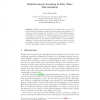Free Online Productivity Tools
i2Speak
i2Symbol
i2OCR
iTex2Img
iWeb2Print
iWeb2Shot
i2Type
iPdf2Split
iPdf2Merge
i2Bopomofo
i2Arabic
i2Style
i2Image
i2PDF
iLatex2Rtf
Sci2ools
125
click to vote
ICANNGA
2007
Springer
2007
Springer
Reinforcement Learning in Fine Time Discretization
Reinforcement Learning (RL) is analyzed here as a tool for control system optimization. State and action spaces are assumed to be continuous. Time is assumed to be discrete, yet the discretization may be arbitrarily fine. It is shown here that stationary policies, applied by most RL methods, are improper in control applications, since for fine time discretization they can not assure bounded variance of policy gradient estimators. As a remedy to that difficulty, we propose the use of piecewise non-Markov policies. Policies of this type can be optimized by means of most RL algorithms, namely those based on likelihood ratio.
Related Content
| Added | 08 Jun 2010 |
| Updated | 08 Jun 2010 |
| Type | Conference |
| Year | 2007 |
| Where | ICANNGA |
| Authors | Pawel Wawrzynski |
Comments (0)

